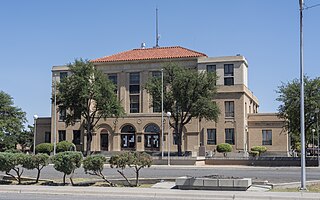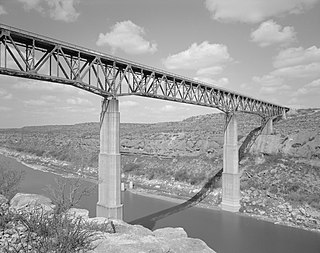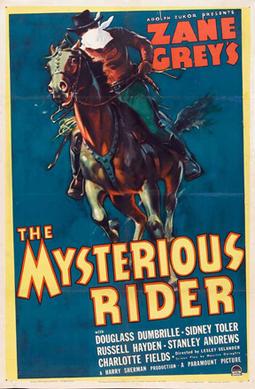Plot
This article needs a plot summary.(January 2024) |
| West of the Pecos | |
|---|---|
| Directed by | Phil Rosen |
| Written by | Milton Krims John Twist |
| Based on | West of the Pecos by Zane Grey |
| Produced by | Cliff Reid |
| Starring | Richard Dix Martha Sleeper |
| Cinematography | James Van Trees Russell Metty |
| Edited by | Archie Marshek |
| Music by | Roy Webb |
Production company | |
Release dates | |
Running time | 70 minutes |
| Country | United States |
| Language | English |
West of the Pecos is a 1934 American Western film directed by Phil Rosen and starring Richard Dix and Martha Sleeper. The screenplay was written Milton Krims and John Twist, who adapted the serial of the same name by Zane Grey, appearing beginning in The American Magazine in 1931 and later as the 1937 novel. The film, which is thought to be lost, was remade as West of the Pecos in 1945.
This article needs a plot summary.(January 2024) |

Reeves County is a county located in the U.S. state of Texas. As of the 2020 census, its population was 14,748. Its county seat and most populous city is Pecos. The county was created in 1883 and organized the next year. It is named for George R. Reeves, a Texas state legislator and colonel in the Confederate Army. It is one of the nine counties that comprise the Trans-Pecos region of West Texas. Reeves County comprises the Pecos micropolitan statistical area.

Pecos County is a county located in the U.S. state of Texas. As of the 2020 census, its population was 15,193. The county seat is Fort Stockton. The county was created in 1871 and organized in 1875. It is named for the Pecos River. It is one of the nine counties that comprise the Trans-Pecos region of West Texas.

Pecos Bill is a fictional cowboy and folk hero in stories set during American westward expansion into the Southwest of Texas, New Mexico, Southern California, and Arizona. These narratives were invented as short stories in a book by Tex O'Reilly in the early 20th century and are an example of American folklore. Pecos Bill was a late addition to the "big man" idea of characters, such as Paul Bunyan or John Henry.

Carlsbad is a city in and the county seat of Eddy County, New Mexico, United States. As of the 2020 census, the city population was 32,238. Carlsbad is centered at the intersection of U.S. Routes 62/180 and 285, and is the principal city of the Carlsbad-Artesia Micropolitan Statistical Area, which has a total population of 62,314. Located in the southeastern part of New Mexico, Carlsbad straddles the Pecos River and sits at the eastern edge of the Guadalupe Mountains.

Pecos is the largest city in and the county seat of Reeves County, Texas, United States. It is in the valley on the west bank of the Pecos River at the eastern edge of the Chihuahuan Desert, in the Trans-Pecos region of West Texas and just south of New Mexico's border. Its population was 12,916 at the 2020 census. On January 24, 2012, Pecos City appeared on the Forbes 400 as the second-fastest growing small town in the United States. The city is a regional commercial center for ranching, oil and gas production, and agriculture. The city is most recognized for its association with the local cultivation of cantaloupes. Pecos claims to be the site of the world's first rodeo on July 4, 1883.

The Pecos River originates in north-central New Mexico and flows into Texas, emptying into the Rio Grande. Its headwaters are on the eastern slope of the Sangre de Cristo mountain range in Mora County north of Pecos, New Mexico, at an elevation of over 12,000 feet (3,700 m). The river flows for 926 miles (1,490 km) before reaching the Rio Grande near Del Rio. Its drainage basin encompasses about 44,300 square miles (115,000 km2).

West Texas is a loosely defined region in the U.S. state of Texas, generally encompassing the arid and semiarid lands west of a line drawn between the cities of Wichita Falls, Abilene, and Del Rio.

Tall Tale is a 1995 American Western adventure fantasy film directed by Jeremiah Chechik, written by Steven L. Bloom and Robert Rodat, produced by Walt Disney Pictures and Caravan Pictures and starring Scott Glenn, Oliver Platt, Nick Stahl, Stephen Lang, Roger Aaron Brown, Catherine O'Hara, and Patrick Swayze. It tells the story of a young farm boy who receives aid from tall tale figures in saving his town from a greedy developer.
Pecos may refer to:

Melody Time is a 1948 American live-action and animated musical anthology film produced by Walt Disney. It was released to theatres by RKO Radio Pictures on May 27, 1948. Made up of seven segments set to popular music and folk music, the film is, like Make Mine Music before it, the popular music version of Fantasia. Melody Time, while not meeting the artistic accomplishments of Fantasia, was mildly successful.

The Trans-Pecos, as originally defined in 1887 by the Texas geologist Robert T. Hill, is the distinct portion of Texas that lies west of the Pecos River. The term is considered synonymous with Far West Texas, a subdivision of West Texas. The Trans-Pecos is part of the Chihuahuan Desert, the largest desert in North America. It is the most mountainous and arid portion of the state, and most of its vast area is sparsely populated. Among the nine counties in the region are the five largest counties by area in Texas and eight of the eleven largest in the state. The area is known for the natural environment of the Big Bend and the gorge of the Rio Grande, part of which has been designated a National Wild and Scenic Rivers System. With the notable exceptions of Big Bend Ranch State Park, Big Bend National Park and the Guadalupe Mountains National Park, the vast majority of the Trans-Pecos region consists of privately owned ranchland. However, most of the region's population reside in the El Paso metropolitan area. Besides El Paso and its metropolitan area, the major cities are Pecos (12,916), Fort Stockton (8,466), and Alpine (6,035). All other settlements have under 5,000 people.

Horace B. Carpenter was an American actor, film director, and screenwriter. He appeared in more than 330 films between 1914 and 1946. He also directed 15 films between 1925 and 1934. Born in Grand Rapids, Michigan, Carpenter died in Hollywood, California, from a heart attack.

The Mysterious Rider is a 1938 American Western film directed by Lesley Selander and starring Douglass Dumbrille, Sidney Toler, and Russell Hayden. Written by Maurice Geraghty based on the 1921 novel The Mysterious Rider by Zane Gray, the film is about a notorious outlaw who returns to the ranch he once owned and takes a job disguised as a ranch hand. Unrecognized by the ranch's current owner, he waits patiently for an opportunity to expose the men who murdered his partner twenty years ago, framed him for the crime, and then stole his ranch. The film was later released for television in the United States as Mark of the Avenger.

West of the Pecos is a 1945 American Western film directed by Edward Killy and starring Robert Mitchum and Barbara Hale. It is the second film version of Zane Grey's novel, previously made in 1934 and also titled West of the Pecos starring Richard Dix. It is no relation to the 1922 silent film of the same name.
West of the Pecos may refer to:

Orphan of the Pecos is a 1937 American Western film produced and directed by Sam Katzman and starring Tom Tyler, Jeanne Martel, Howard Bryant, and Forrest Taylor. Written by Basil Dickey, the film is about a cowboy who is falsely accused of murdering a rancher whose body he discovers. Before the sheriff arrives, he escapes and tries to find evidence to clear his name and help the rancher's daughter save her ranch. The film was released in the United States on December 30, 1937 by Victor Pictures.

The Dude Goes West is a 1948 American comedy western film starring Eddie Albert and Gale Storm. It was directed by Kurt Neumann and released by Monogram Pictures. The film was originally known as Tombstone.

Beyond the Pecos is a 1945 American Western film directed by Lambert Hillyer and written by Bennett Cohen. The film stars Rod Cameron, Eddie Dew, Fuzzy Knight, Jennifer Holt, Ray Whitley, Gene Roth, Robert Homans and Jack Ingram. The film was released on April 27, 1945, by Universal Pictures.

The Stranger from Pecos is a 1943 American Western film directed by Lambert Hillyer and written by Adele Buffington. This is the second film in the "Marshal Nevada Jack McKenzie" series, and stars Johnny Mack Brown as Jack McKenzie and Raymond Hatton as his sidekick Sandy Hopkins, with Kirby Grant, Christine McIntyre, Steve Clark and Edmund Cobb. The film was released on July 10, 1943, by Monogram Pictures.

Blazing Across the Pecos is a 1948 American Western film directed by Ray Nazarro and written by Norman S. Hall. The film stars Charles Starrett, Patricia Barry, Paul Campbell, Charles C. Wilson, Thomas E. Jackson, Red Arnall and Smiley Burnette. The film was released on July 1, 1948, by Columbia Pictures.